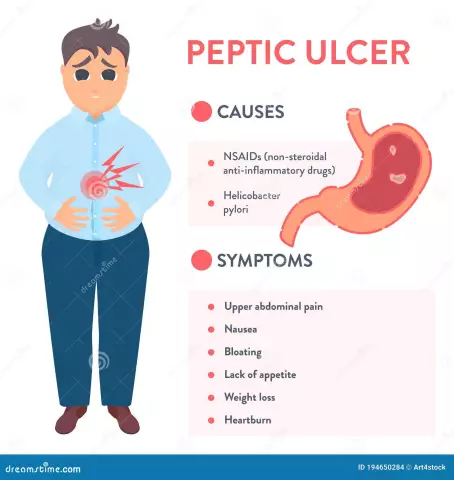- Author Rachel Wainwright wainwright@abchealthonline.com.
- Public 2023-12-15 07:39.
- Last modified 2025-11-02 20:14.
Stomach ulcer
A stomach ulcer is a deep defect in the gastric mucosa resulting from an inflammatory process caused by a damaging factor. A disease in which an ulcer forms in the stomach is called gastric ulcer. This is a common disease that affects about 10% of the population, and men are several times more likely than women.
Peptic ulcer causes

Several factors are involved in the formation of stomach ulcers, the main of which is infection with Helicobacter pylory. For a long time it was believed that bacteria do not survive in a very acidic environment of gastric contents, until at the end of the twentieth century it was convincingly proved that the microorganism Helicobacter pylory not only survives there, but is also the main link in the mechanism of the occurrence of inflammatory diseases of the stomach and duodenum.
Other factors contributing to the development of gastric ulcer are:
- Frequent use of non-steroidal anti-inflammatory drugs (aspirin, naklofen, ibuprofen, indomethacin, nemesil, etc.)
- Hereditary predisposition;
- Gross errors in nutrition;
- Psychogenic factors (stress);
- Alcoholism;
- Constant burn of the gastric mucosa with hot food.
Stomach ulcer symptoms
The main symptom of a stomach ulcer is severe pain in the epigastric (epigastric) region. Stomach ulcer is characterized by hungry pains that occur several hours after eating, and often at night. The pain subsides after eating or antacid (acidity-reducing) drugs.
The rest of the symptoms of stomach ulcers include dyspeptic phenomena indicating a disorder of the digestive process: heartburn, belching, nausea, sometimes vomiting of acidic stomach contents, which occurs with severe pain and brings some relief, and therefore sometimes patients with stomach ulcers themselves cause vomiting during pain attack. A person suffering from gastric ulcer loses weight, his skin looks pale, appetite and vitality decrease.
Sometimes blood appears in the gastric contents, and sometimes in the feces. This happens when a vessel is involved in the ulcerative process. Blood clots can be red in color, but they can also be dark, almost black, which is sometimes misleading. The release of blood with vomit or feces can be not only a symptom of a stomach ulcer, but also a sign of a malignant tumor, therefore, requires an urgent visit to a doctor.
Diagnostics of the stomach ulcer

Currently, the diagnosis of stomach ulcers is carried out on the basis of endoscopic examination. The method is called fibrogastroscopy (FGS), during which a thin flexible instrument is inserted through the esophagus into the stomach, equipped with a light source and a camera that transmits the image to a monitor. This allows you to see the ulcerative defect in the gastric mucosa, determine its location and size. The previously widely used method of contrast fluoroscopy is still used today, but has only an auxiliary value.
Laboratory studies of gastric and intestinal contents for the presence of Helicobacter pylori and occult blood are carried out, general blood and urine tests are prescribed to assess the general condition of the body.
Stomach ulcer treatment
For tens, if not hundreds of years, gastric ulcer was considered an incurable disease, in which, and even then not always effectively, surgery could only help. After the discovery of the main cause of the disease, namely, infection with Helicobacter pylori, the treatment of gastric ulcer began to be carried out with therapeutic agents, primarily by taking antibiotics. Currently, the gold standard for the treatment of stomach ulcers is a three-component therapy, which includes: a drug that is a proton pump inhibitor (omeprazole and the like), a bismuth drug, the simultaneous administration of two antibacterial drugs.
In parallel, antacids are prescribed - agents that reduce the acidity of gastric contents. Such treatment allows in most cases to cure a stomach ulcer within two weeks.
One of the most important points in the treatment of stomach ulcers is adherence to diet and diet. This also serves as the main preventive measure aimed at preventing relapse. The diet for stomach ulcers should be balanced, containing a sufficient amount of nutrients, while excluding foods that irritate the gastric mucosa (alcohol, coffee, strong tea, hot spices, smoking, salting, etc.). Food is served thermally processed (stewing, boiling, baking or steaming, frying in oil is excluded) and grated. Meals should be fractional - in small portions 4-5 times a day, at a certain time. A diet for stomach ulcers should become a way of life, if not for life, then for several years, even after reaching remission, although some mitigation is permissible during this period,otherwise, the re-development of gastric ulcer is possible, since there remains a predisposition to it and the possibility of re-infection with Helicobacter pylori.

Surgical treatment of gastric ulcer is used for persistent ulcers that do not respond to therapy, as well as with a high risk of complications (perforation of the stomach wall, bleeding). In this case, a section of the stomach containing an ulcerative defect is excised, in parallel, drug treatment of a stomach ulcer is prescribed to prevent recurrence of the disease.
In the rehabilitation period, the treatment of gastric ulcer is carried out with the help of physiotherapy, as well as balneology methods. They carry out general strengthening procedures, it is highly recommended to change the lifestyle to a healthier one and give up bad habits (smoking, drinking alcohol, eating fast food and other unhealthy foods).
YouTube video related to the article:
The information is generalized and provided for informational purposes only. At the first sign of illness, see your doctor. Self-medication is hazardous to health!






